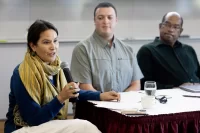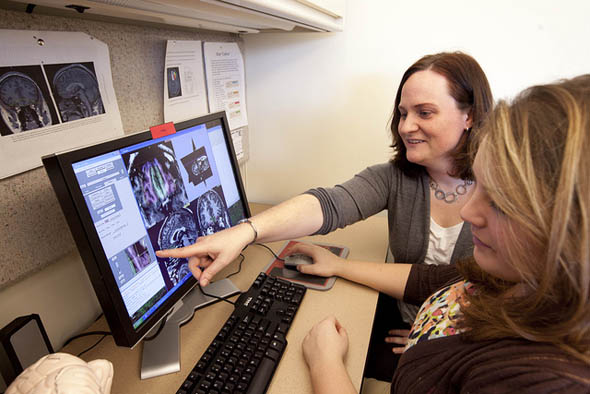
Storytelling approach to teaching science gets results for Kroepsch recipient
Praised by students for her creativity and clarity in conveying the complex technical and moral aspects of neuroscience, Assistant Professor of Psychology Nancy Koven is one of this year’s two recipients of the Bates College award for superior teaching.
Koven, a clinical neuropsychologist who studies connections between brain regions and cognitive and emotional functions, shares the Ruth M. and Robert H. Kroepsch Award for Excellence in Teaching with Sonja Pieck, assistant professor of environmental studies.
Pieck is on sabbatical during the winter semester and spring Short Term in 2011. Bates students and recent alumni nominate faculty for the Kroepsch award, and a committee of previous faculty Kroepsch recipients selects the honoree.
Koven researches the anatomical roots of such cognitive functions as working memory or self-evaluation, and affective functions like attention to one’s own emotions. Her particular focus is how these regions and processes are interrelated in people suffering from mental illness, such as bipolar disorder.
Koven, who joined the Bates faculty in 2006, teaches courses in abnormal psychology, cognitive neuroscience and affective neuroscience, among others.
“In neuroscience we have great technology, and it takes about all of your attention span just to keep up with it,” she says. “But the field lags behind on the front of translating that into the real world and dealing with real people.
“A big challenge for me in teaching is to get students to realize that that gap exists, and to know that it’s a gap they need to bridge — and also to realize that sometimes knowing the answers is not always what it takes to make someone better. You need to take the facts and situate them in the individual’s context.”
As a teacher, “I encourage my students to take what they’ve just learned, repackage it and teach it to somebody else,” Koven says. “When I walk through Pettengill at the end of the day and hear students teaching each other — saying, ‘Wait, back up, you forgot something’ — that makes me smile. They’ll tell me, ‘I knew I really knew it when I had to teach it to somebody else.’ ”
Storytelling, too, is a favored technique for imparting dense and complex concepts. “The best teachers I ever had were great storytellers,” Koven says. “I learn best when I situate myself almost as a reader trying to learn a story. And then when I teach, even though it’s science, I try to teach it like a story.”
When Scott Sinisgalli of the class of 2010, now a health policy research assistant at Mathematica Policy Research in Cambridge, Mass., took Koven’s “Cognitive Neuroscience” course, Koven explained the effects of diseases like Huntington’s and Parkinson’s by framing certain brain regions as characters trying to get messages to other regions.
“At the end of the story, she showed why each symptom occurred in the context of the chain of messages,” Sinisgalli says. “Her approach focuses on the fundamentals of what’s happening at each step, and how they affect the end result.”
For her honors thesis, a rigorous yearlong research project, senior psychology major Rachel DiStefano of Randolph Center, Vt., is investigating underlying causes of a condition in which an individual can’t identify or describe emotions. Koven is her adviser in this research into the affliction, called alexithymia.
“Her passion for research has been contagious,” says DiStefano, “and has made me appreciate the importance of psychological research on a broader level.”
Typically for Bates, the connections between Koven and her students endure past Commencement. Allison Earon pursued a master’s degree in public health after graduating, in 2009, and will graduate this spring from the Rollins School of Public Health at Emory.
“Nancy’s role as my adviser has never stopped,” she says. “Now I’m applying to medical school and she just recently updated yet another letter for my application. My ongoing communication and friendship with Nancy continues to make me feel connected to Bates.”
Koven believes that her teaching simply mirrors what she sees around her at Bates. “It helps to have excellent colleagues. Everyone’s priority here is just to be the best teacher they can.”





